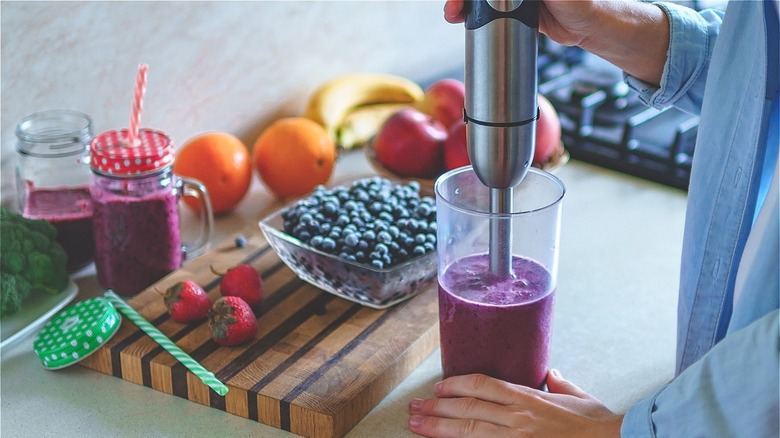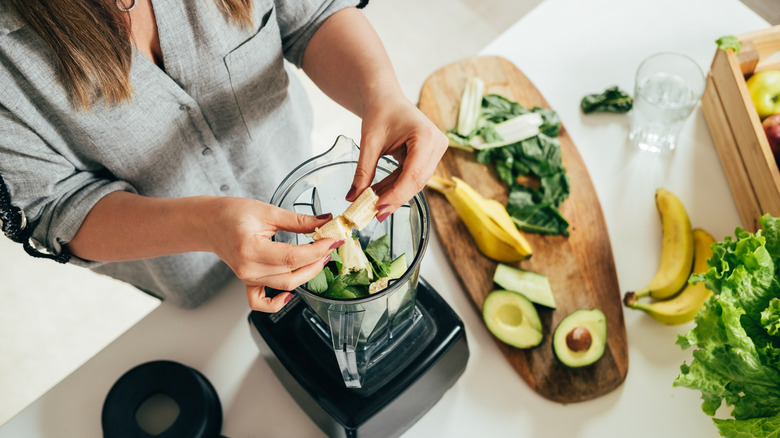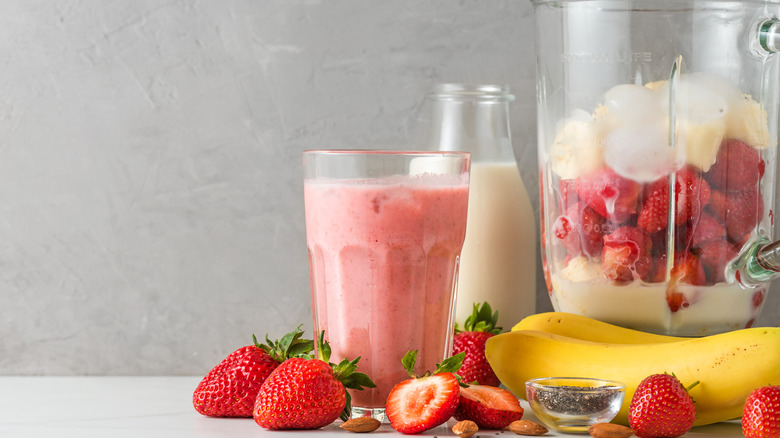Why Homemade Smoothies Are Generally Better Than Pre-Made Ones
The smoothie trend is here to stay, at least for a few more years. According to a Research and Market press release, the smoothie market hit a $14 billion valuation in 2020 — and economic forecasters, aka the money people, say this number is going to grow moderately over the next five years.
Given how much we like these healthy blends of fruit and vegetables whipped up into a drink, this isn't really surprising. After all, they make us feel like we are doing our part to maintain a diet that is nutrient-rich and free from excessive carbs and sugars. Who doesn't love going into Smoothie King for a Coffee High Protein Vanilla smoothie, strolling into a Tropical Smoothie Cafe and ordering the smoothie of the month, or picking up a few bottles of Bolthouse Farms pre-made smoothies? It's hard not to appreciate how delicious and convenient they are.
Adding smoothies to your daily diet can make you feel great about yourself. According to BBC Good Food, smoothies use a lot of fruit and vegetables. Thus, having them every day increases your daily fiber intake while boosting your vitamin C consumption. Plus, smoothies are an easy way to get regular helpings of important food groups. However, if smoothies are going to be a part of your meal plan, nutritionists are saying that the pre-made versions of these drinks may not be the way to go (per MSN.com).
You can control your ingredients
It all goes back to that old cliche: You are what you eat.
Per the Washington Post, to make a basic smoothie, you need three ingredients: a liquid, some vegetables and/or fruits, and something frozen like ice or frozen fruit. However, it is the addition of other ingredients to an otherwise healthy beverage that complicates things. MSN.com shares that pre-made smoothies tend to contain more than just fruits, vegetables, water, and ice. According to Jacquelyn Costa, R.D., a clinical dietitian at Temple University Hospital in Philadelphia, "A 20-ounce commercial smoothie can be upwards of 200 to 1,000 calories, one to 30 grams of fat, and 15 to 100 grams of added sugar." That really eats into your daily caloric, fat, and sugar intake, and definitely puts a damper on any attempt to add such drinks to your daily routine.
So, what's the alternative? Experts suggest making your smoothies at home, which allows you to control which ingredients actually go into it. And as the Washington Post points out, buying smoothies pre-made can be expensive, so making your own smoothies at home can save you a few bucks as well.
Some healthy ingredients to add to your smoothie
But what are some healthy ingredients you can add to your smoothie to enhance its taste without going overboard on the calories, fat, and sugar?
The Washington Post recommends experimenting with a host of ingredients, depending on your taste buds. If you are looking to add a little oomph to your smoothie, try protein powders or fiber-rich chia, hemp, or flax. Looking for a pop of sweet flavor? Add some herbs, zest, honey, or other natural sweetners. If you like your smoothie with a little spicy heat, try a pinch of cinnamon, ginger, or cayenne.
Foodal notes that if you are a fan of pears, apples, and cucumbers, you can balance the sweetness of the fruit with a splash of apple cider vinegar. Meanwhile, green smoothie aficionados should consider adding some spirulina to their spinach- and apple-based drinks. This will give you maximum flavor without padding the calories.


